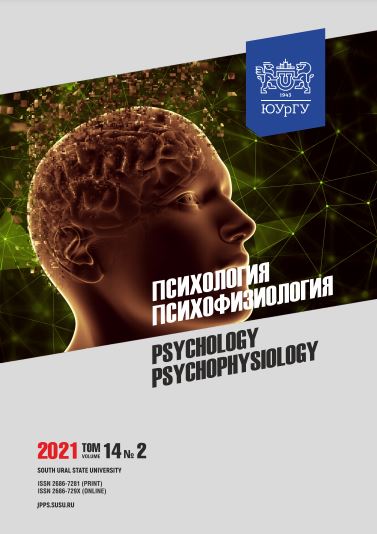ASSESSMENT OF PSYCHOPHYSIOLOGICAL POTENTIAL UNDER ADAPTATION TO EDUCATIONAL ACTIVITY
Abstract
Abstract. The authors investigate new approaches to the search of integral psychophysiological characteristics that allow determining the ability of an individual to adapt to specific conditions of the educational environment. Aim: The paper aims to assess the psycho-autonomic status of a person involved in educational activities depending on the mechanisms of autonomic and neuropsychological regulation. Materials and methods: 253 students (1–4 year) of the biological faculty of the Kemerovo State University took part in a two-stage study. The following psychophysiological indicators were used for the purpose of the study: variation heart rate monitoring, interhemispheric asymmetry, description of the nervous system, psychological and personal traits; the data obtained as a result of variation heart rate monitoring and measuring response to mental load and stress were examined twice. The data obtained were used for forming groups depending on the strength of nervous processes and stress index. Results: The authors obtained the data on the correlation between educational activities and psychophysiological characteristics in university students. The following indicators are considered as of the best prognostic value: the strength of nervous processes, cardiovascular system response, interhemispheric asymmetry.
The differences in response direction were detected depending on the initial stress level and allowed to determine the influence of heart rate on the so-called strategy and price of adaptation. The most favorable qualities for academic success were found in students with a predominance of right motor and left sensory asymmetries: good adaptation, high concentricity, better autonomic balance, mental stability and low personal anxiety. Students with a high stress index at rest and worse academic performance were characterized by high situational anxiety, increased adequacy of regulatory processes responsible for the activation of central heart rate regulation, and significantly reduced psychosocial adaptation after the exam. Conclusion: The results obtained suggest that the assessment of potential academic success in students should take into account psychophysiological potential that consists of both the specific functional system (psycho-emotional sphere, cognitive sphere, personal qualities, neurodynamic sphere and interhemispheric asymmetry) and non-specific functional system (regulation of autonomic functions at rest and under stress, psychosocial adaptation).
Downloads
References
2. Минасян С.М., Галстян А.Г. Воздействие факторов учебного процесса на функциональное состояние студентов // Естественные и технические науки. 2015. № 7 (85). С. 33–34. URL: https://elibrary.ru/ item.asp?id=24318421
3. Особенности функционального состояния организма студентов в процессе обучения в медицинском вузе / В.И. Павлова, Н.В. Котова, С.С. Кислякова [и др.] // Современные проблемы науки и образования. 2016. № 1. С. 17. https://elibrary.ru/item.asp?id=25509264
4. Stress, negative social exchange, and health symptoms in university students / K.J. Edwards, P.J. Hershberger, R.K. Rusell, R.J. Markert // J. Am. Coll. Health. 2001. Vol. 50 (2). P. 75–79. DOI: 10.1080/07448480109596010
5. Психофизиологические особенности студентов с симптомами синдрома дефицита внимания в условиях сочетанных умственных и физических нагрузок / И.Ф. Харина, Е.В. Звягина, Е.В. Быков, О.А. Макунина // Вестник Новосибирского государственного педагогического университета. 2018. Т. 8, Вып. 3. С. 181–197. DOI: 10.15293/2226-3365.1803.13
6. Баевский Р.М., Иванов Г.Г. Вариабельность сердечного ритма: теоретические аспекты и возможности клинического применения // Ультразвуковая и функциональная диагностика. 2001. № 3. С. 108–127. https://elibrary.ru/item.asp?id=25990135
7. Heart rate variability and photoplethysmogram indicators in assessment of adaptation levels in students experiencing examination loads / S. Astakhov, A. Nenasheva, A. Astakhov, A. Ragozin // Gazzetta Medica Italiana Archivio per le Scienze Mediche. 2018. Vol. 177 (3). P. 1–8. DOI: 10.23736/S0393-3660.17.03722-6
8. Glebov V.V, Arakelov G.G. Level of schoolboys psychophysiological adaptation process in metropolis megapolis // Procedia – Social and Behavioral Sciences. 2014. Vol. 146. P. 226. DOI: 10.1016/j.sbspro.2014.08.119
9. Lim H.J., Chung S.S., Joung K.H. Fac-tors of depressive symptoms among elemen-tary, middle and high school students // Archives of Psychiatric Nursing. 2016. Vol. 30 (3). P. 302–308. DOI: 10.1016/j.apnu.2015.11.010
10. Леутин В.П., Николаева Е.И. Психофизиологические механизмы адаптации и функциональная асимметрия мозга. Новосибирск: Наука. 1988. 193 с. https://elibrary.ru/ item.asp?id=21696922
11. Elenkov I.J., Chrousos G. P. Stress system – organization, physiologe and immu-noregulation // Neuroimmunomodulation. 2006. Vol. 13, № 5. P. 257–267. DOI: 10.1159/000104853
12. Куулар Ш.В., Будукоол Л.К.-С. Психофизиологические особенности студентов с разным типом стратегии поведения в конфликтных ситуациях // Вестник Новосибирского государственного педагогического университета. 2017. Т. 7, № 5. С. 67–80. DOI: 10.15293/2226-3365.1705.05.
13. Lu W., Wang, Z. Physiological adap-tation to recurrent social stress of extraversion // Psychophysiology. 2017. Vol. 54 (2). P. 270–278. DOI: https://doi.org/10.1111/psyp.12777
14. Айзман Р.И., Лебедев А.В., Айзман Н.И., Рубанович В.Б. Методология и практика мониторинга здоровья учащейся молодежи // Журнал научных статей «Здоровье и образование в XXI веке». 2017. Т. 19, № 5. С. 73–78. https://elibrary.ru/item.asp?id=28278749
15. Иванов В.И., Литвинова Н.А., Березина М.Г. Автоматизированный комплекс для оценки индивидуально-типологических свойств и функционального состояния организма человека «Статус ПФ» // Валеология. 2004. № 4. С. 70–73. https://elibrary.ru/ item.asp?id=29803376
16. Особенности психофизиологической адаптации учащихся в различных условиях обучения / О.Л. Тарасова, О.Н. Четверик, А.И. Федоров [и др.] // Вестник Новосибирского государственного педагогического университета. 2016. № 1 (29). С. 23–37. DOI: 0.15293/2226-3365.1601.02
17. The Relationship Among Psychological and Psychophysiological Characteristics of Fibromyalgia Patients / K. Thieme, D.C. Turk, R.H. Gracely et al. // The Journal of Pain. 2015. Vol. 16 (2). P. 186–196. DOI: 10.1016/j.jpain.2014.11.009
18. Effect of sociobiological factors on the formation of adaptive responses in school students during puberty / E.M. Kazin, I.A. Sviridova, M.G. Berezina [et al.] // Human Physiology. 2008. Vol. 34, № 4. P. 431–439. DOI: 10.1134/S0362119708040063.
19. Медведев В.И. Адаптация человека. СПб.: Институт мозга человека РAН. 2003: 270. https://elibrary.ru/item.asp?id=20078483
References on translit
-Copyright (c) 2021 Psychology. Psychophysiology

This work is licensed under a Creative Commons Attribution-NonCommercial-NoDerivatives 4.0 International License.



